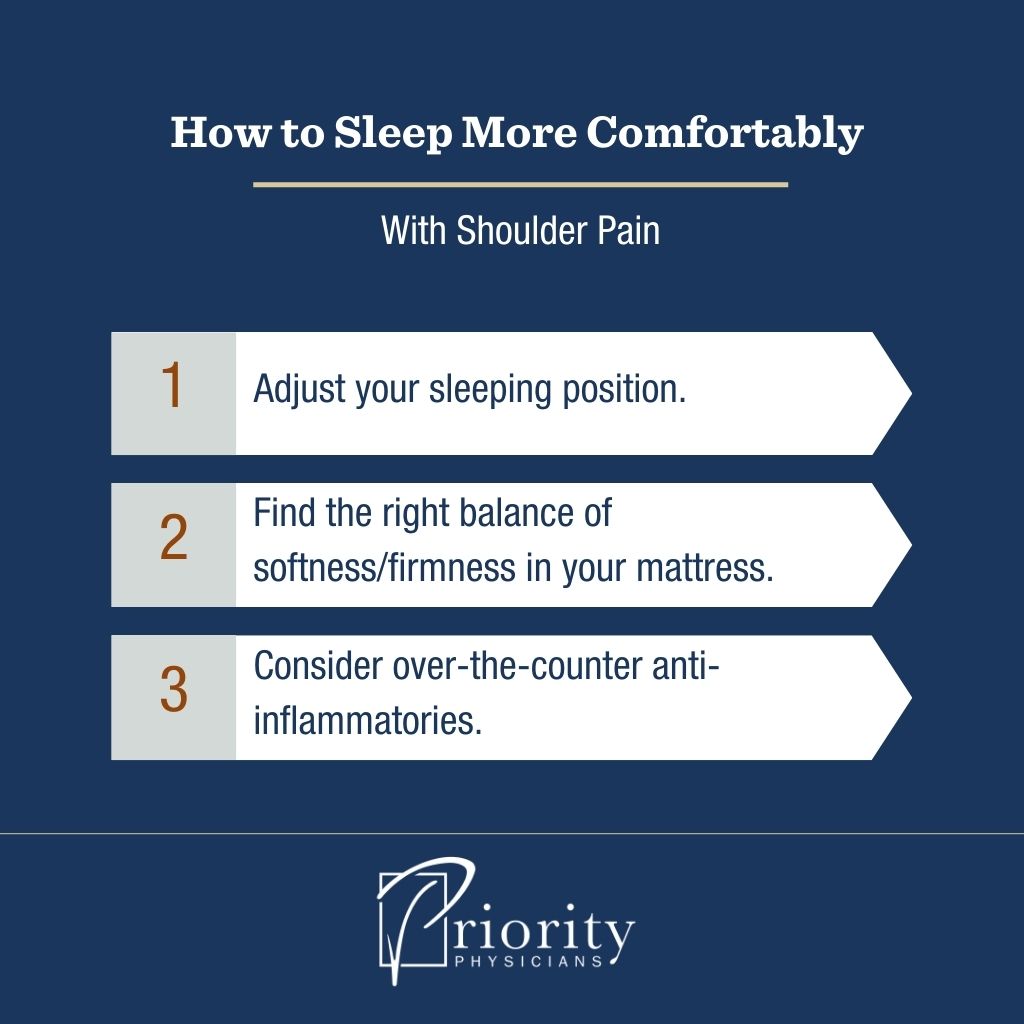Why does my shoulder hurt when I sleep? It’s a common question, especially for people over 40. But shoulder pain can affect people at any age.
When you’re asleep, your body has a high tolerance for pain and distraction.
Even the lightest of sleepers are capable of ignoring a certain threshold of noise, light, smell, and sensation. Sleep disruptions inhibit our natural abilities to heal, recover, and reduce stress, and our bodies work hard to minimize them.
When something hurts to the point that it’s waking you up at night, it’s crossing that threshold — and telling you to pay attention.
One of the most common sleep disturbances I hear about from my patients is shoulder pain. Many types of physical activity take a toll on our shoulders, from working out to lifting objects around the home or workplace. This, combined with the anatomical complexity of the shoulder, makes it susceptible to a range of injuries. In fact, shoulder pain affects about a quarter of adults at any given time.
In this post, we’ll take a look at the possible reasons why your shoulder hurts when you sleep, and what you can do about it.
Why Your Shoulder Hurts When You Sleep
Shoulder pain that’s waking you up at night usually comes from one of three conditions: rotator cuff injuries, bursitis, or osteoarthritis.
What a Rotator Cuff Injury Feels Like
The rotator cuff is made up of a group of muscles that engage when you lift your arms and move them away from your body. Rotator cuff pain is a sharp, grabbing pain that’s most noticeable when you lift objects above your head, but it can also surface during other arm movements — or while you sleep.
What Shoulder Bursitis Feels Like
Bursitis is inflammation of the bursae, fluid-filled sacks that provide cushioning between bones and tissues in joints. Shoulder bursitis is the result of injury or overuse that causes irritation and a buildup of fluid.
Compared to a rotator cuff injury, bursitis tends to cause a less intense but more lingering pain that’s triggered by any arm movement, making it a significant inhibitor of daily activity.
What Shoulder Osteoarthritis Feels Like
Shoulder pain that feels like a constant dull ache could indicate the presence of osteoarthritis, a condition in which the tissues in the joint break down over time. Also known as “wear-and-tear arthritis,” osteoarthritis is the most common form of arthritis. Shoulder osteoarthritis typically refers to the breakdown of cartilage in the big ball-and-socket joint in the shoulder (also called the glenohumeral joint).
Ways to Treat Shoulder Pain
The good news is that many shoulder injuries heal with time, physical therapy, and/or targeted treatments, some of which we’ll look at next.
Rotator cuff injuries. Shoulder injections, or subacromial injections, can ease rotator cuff injuries and bursitis. A subacromial shoulder injection introduces an anti-inflammatory corticosteroid and an anesthetic into a space above the rotator cuff.
Joint injections like this one can provide pain relief for six weeks to six months, or longer, and can help sufferers sleep while bursitis or more minor rotator cuff injuries heal.
Bursitis. To treat bursitis, your physician may recommend a prescription dose of an anti-inflammatory medication such as naproxen. They can also help you pinpoint and limit the activities that irritate the bursae, giving your shoulder the opportunity to heal.
Osteoarthritis. Medications, exercise, and physical therapy can all help manage mild-to-moderate symptoms of osteoarthritis. If these approaches don’t bring you relief, joint replacement surgery is another option. To learn more, visit our previous post about the pros and cons of joint replacement surgery and how to know if it’s right for you.
How to Sleep More Comfortably With Shoulder Pain
While it can be tempting to turn to a sleep aid to overpower your hurting shoulder and get a good night’s sleep, it’s important to pay attention to the signals your body is giving you and address the root cause of the pain. Temporary pain that lasts a night or two probably isn’t cause for concern, but shoulder pain that interferes with your rest for weeks on end indicates a problem that needs treatment.
Only a physician can diagnose persistent shoulder pain and recommend a treatment that matches the problem. If your shoulder pain is bad enough to wake you from sleep for weeks or months, we strongly recommend reaching out to a trusted physician to investigate the root cause and get you some relief.
In the meantime, however, there are steps you can take to make your sleeping environment more comfortable:
- Adjust your sleeping position. Experiment with sleeping positions that don’t trigger your shoulder pain. For example, if you’re dealing with a rotator cuff injury, reaching above your head while you sleep will trigger pain. Instead, try sleeping with your elbow positioned below your shoulder so you don’t aggravate the injury.
- Find the right balance of softness/firmness in your mattress. A mattress that’s too firm may irritate an injury, while an overly soft mattress will let your body sink too far into the bed, also causing your shoulder to hurt. Find a mattress that provides effective support but has enough give to comfortably cushion your shoulder.
- Consider over-the-counter anti-inflammatories. Ibuprofen and naproxen can relieve pain and inflammation from your injury while you seek treatment. Tylenol can also help with pain, though it doesn’t impact inflammation.
Get Relief from Your Shoulder Pain (and a Better Night’s Sleep!)
Shoulder pain can be debilitating, and it’s even more frustrating when it robs you of much-needed sleep. Shoulder injuries become more common with age, which is why it’s important to use caution with exercise and strenuous activity as you get older. If you do injure your shoulder, however, you have treatment options to ease the pain and restore your sleep.
If you’re wondering why your shoulder hurts when you sleep, it’s time to investigate your pain in partnership with a trusted physician. Reach out to your doctor so that you can discover the source, treat the root cause, and get back to sleep.


